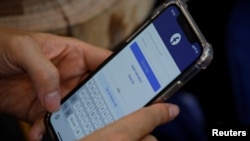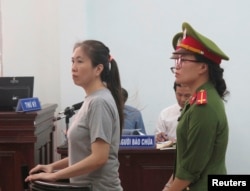A move by Vietnam to make all social media users verify their identity is a way to curb one of the few remaining spaces for criticism and independent journalism, analysts say.
Vietnam's Ministry of Information earlier in May announced an amendment to the Telecommunications Law that will require foreign and local social media networks to confirm the identities of their users. Those who refuse or fail to comply could find their accounts blocked.
The ministry said the change — which if approved would go into effect later in 2023 — is necessary to combat cybercrime. But digital rights and press freedom experts say it will make it harder for people to criticize the government in a country where those who do so publicly are often persecuted.
"To force internet users to give up their actual identity and to sacrifice their anonymity is going to shut down freedom of expression on the internet, which is something that is much more damaging than some digital crimes committed by some very few people," said Trinh Huu Long.
The founder of the journalism and research group Legal Initiatives for Vietnam grew up in Vietnam but now lives in Taiwan.
"We are in a difficult time for digital freedom, as well as human rights in Vietnam in general," Long told VOA.
Vietnam's Washington embassy did not reply to VOA's email requesting comment.
If approved, the legal measure will enable authorities to track down those suspected of breaking laws, the state-run Voice of Vietnam newspaper reported.
Sometimes authorities can identify a social media account linked to someone suspected of breaking a law, but they are unable to track down the individual, the deputy minister of information, Nguyen Thanh Lam, was cited as saying. "Unverified accounts, no matter on local or foreign platforms such as Facebook, TikTok, YouTube, will be dealt with," he said.
Vietnam has one of highest rates of online fraud in Asia, but digital rights and press freedom experts maintain that the measure has less to do with criminal activity and is designed more to limit criticism of the government.
In a country with limited space for critical voices "online anonymity has been extremely effective in promoting freedom of expressions," said Michael Caster, who covers Asia for the digital rights group Article 19. But "real name registration schemes can be easily abused by the authorities and can become a tool of repression."
While online anonymity may not fall under freedom of expression, it is part of the right to privacy, and both are protected by international human rights law, Caster told VOA.
"Identity verification requirements generally curtail the right to privacy online," Caster said, adding, "Online circumvention and tools for anonymity are also crucial for journalists, human rights defenders, political opposition figures, and marginalized communities."
Vietnam already has one of the world's worst press freedom environments, ranking alongside North Korea and China for dire media rights. Media watchdog Reporters Without Borders, or RSF, ranked Vietnam 178 out of 180 countries, where 1 shows the best environment.
With few independent news outlets able to operate inside Vietnam, bloggers and citizen journalists offer a rare critical voice. But those voices are often targeted. At least 42 journalists are currently detained in Vietnam, according to RSF.
The rights group Freedom House has classified Vietnam's internet landscape as "not free." And the proposed regulation is the latest in a series of moves designed to curb internet freedoms and quell criticism in Vietnam, according to Dhevy Sivaprakasam, who focuses on Asia for the digital rights group Access Now.
"This is another tool they're going to use against activists and critics and people who dissent against the regime," Sivaprakasam told VOA from Singapore. "It's just one in a series of other online and cyber-related regulations that could be abused."
Sivaprakasam pointed to Vietnam's criminal code, which prohibits speech that is critical of the government, as another example.
In 2018, Vietnam passed a sweeping cybersecurity law that gave authorities the power to censor users' posts and force tech companies to turn over user data.
"It was very effective in spreading fear among the public," Long said about the cybersecurity law.
That law left people feeling too scared to talk about political issues that the government might deem sensitive, Sivaprakasam said. He believes a mandatory identity verification regulation will only exacerbate that climate.
"This is going to create some kind of even bigger fear than we are having right now," he said. "And that fear is going to be much more damaging."
As far as internet and press freedom issues go, Vietnam is not an outlier in Southeast Asia.
U.N. experts have said Myanmar's military is trying to use internet shutdowns to establish a "digital dictatorship" following its 2021 coup, and last summer the Indonesian government introduced legislation requiring tech companies to remove content that it deems unlawful or that "disturbs public order."
On the RSF World Press Freedom Index, 9 of the 10 member states of the Association of Southeast Asian Nations are ranked in the bottom half. Malaysia, the exception, ranks 73 out of 180 countries in terms of press freedom.





